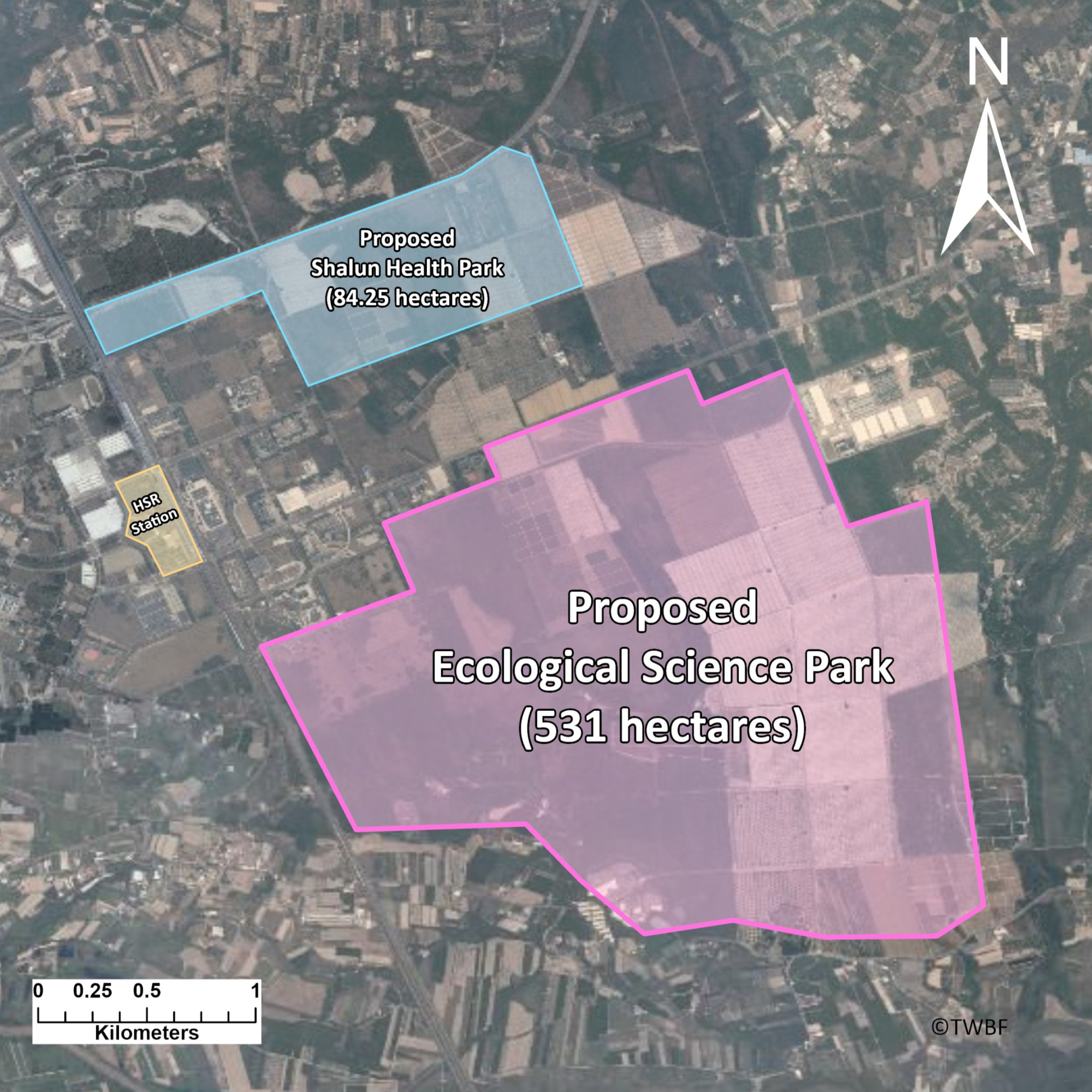【Joint Statement】An Ecological Park Should Not Destroy an Ecological Hotspot: Addressing the Controversy Over the Shalun Farm Development Site
The Taiwan Wild Bird Federation, the Wild Bird Society of Tainan, and the Kaohsiung Wild Bird Society are voicing strong opposition to the government's plan to expand the Shalun Smart Green Energy Science City in Tainan (沙崙智慧綠能科學城擴建計畫). As part of this expansion, the government has designated 531 hectares for the so-called Ecological Science Park (生態科學園區) and about 84 hectares for the Shalun Health Park (沙崙健康園區). Together, these projects would cover more than 600 hectares, nearly two-thirds of Shalun Farm's 950 hectares, despite the site being widely recognized as an ecological hotspot.
We are not opposed to development, but we reject a project that is riddled with contradictions in both process and logic. The clearest example is the name itself: calling these projects "ecological" while placing them directly on top of critical ecological land. We call on the government to acknowledge this contradiction and carry out a comprehensive review.
Shalun's ecological value cannot be ignored
Shalun Farm has been designated by the Ministry of Agriculture's National Ecological Green Network as a "grassland conservation corridor." It is a critical habitat for the Australasian Grass-Owl (Tyto longimembris pithecops), a Category I protected species, and home to the Ring-necked Pheasant (Phasianus colchicus formosanus), listed as Nationally Critically Endangered (NCR) in the Red List of Birds of Taiwan.
This grassland ecosystem supports a complete food chain and provides reliable foraging and activity areas for many protected species, including the Black-winged Kite (Elanus caeruleus), Common Kestrel (Falco tinnunculus), Short-eared Owl (Asio flammeus), and Oriental Pratincole (Glareola maldivarum). Long-term records from the global citizen-science platform eBird show that more than 150 bird species have been observed here, including 35 protected species. It is also home to mammals such as the Formosan Hare (Lepus sinensis formosus) and Masked Palm Civet (Paguma larvata taivana).
These facts show that Shalun Farm is a critical habitat for sustaining the ecosystems of Taiwan's southern plains. Undervaluing its ecological importance would cause permanent damage to regional biodiversity.
An Ecological Science Park That Replaces Actual Ecology?
The contradiction could not be clearer: on the very land that requires protection, the government plans to build the Ecological Science Park (531 ha) and the Shalun Health Park (84 ha) as part of the broader Shalun Smart Green Energy Science City. Does the word "ecological" in the name reflect a genuine value, or is it simply a label to justify development?
If the government truly seeks to balance ecology and development, the first principle should be to avoid ecological hotspots, not to build on top of them. Instead, the current approach, which resembles "shooting the arrow and then drawing the target," forces a project that should be dedicated to conservation and research to become a driver of habitat destruction. This not only contradicts its stated purpose but also undermines trust in government policy.
Development Without a Scientific Basis Gambles with the Environment's Future
Responsible development must follow the ecological principles of "avoidance, minimization, mitigation, and compensation," with avoidance of critical habitats as the first priority. Yet there is still no basic data on how wildlife beyond birds uses this area. Proceeding with a large-scale project in such an information vacuum recklessly ignores the avoidance principle and makes it impossible to measure real impacts scientifically.
We already know where this leads. At the Ciaotou Science Park, environmental commitments made to address impacts on the Australasian Grass-Owl (Tyto longimembris pithecops), such as setting aside a mud-volcano reserve or attempting off-site conservation, failed to deliver results even after four years. This shows that compensation measures for rare species like the Grass-Owl are unreliable and cannot guarantee success. Preserving intact habitat to the fullest extent possible is the only responsible option.
Violating Global Sustainability Trends and Creating Financial Risks
Around the world, companies and investors are aligning with sustainability frameworks such as the Sustainable Development Goals (SDGs), the Convention on Biological Diversity (CBD), and the Taskforce on Nature-related Financial Disclosures (TNFD). Taiwan's development model, however, remains locked in outdated thinking.
Building in areas of ecological controversy destroys valuable national assets and exposes future tenant companies to significant risks: supply-chain scrutiny from international brands, financial pressure from ESG-focused investors, and consumer boycotts tied to reputational damage. Poor site selection not only undermines Taiwan's international sustainability commitments but also creates uncertainty for future economic growth.
Our Demands
We call on the government to immediately suspend all development at Shalun Farm and restart a transparent, science-based assessment process that includes public oversight. No large-scale development should proceed until effective conservation measures are in place and there is clear social consensus on the siting issue.
Issuing Organizations
Taiwan Wild Bird Federation, Wild Bird Society of Tainan, Kaohsiung Wild Bird Society
 Map of the proposed development area of Shalun Health Park and Ecological Science Park
Map of the proposed development area of Shalun Health Park and Ecological Science Park
